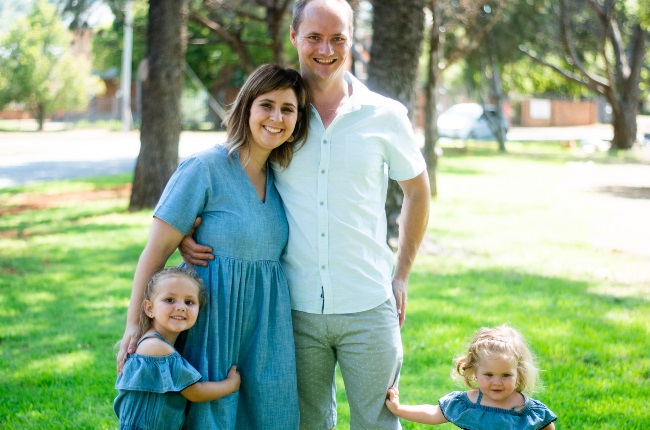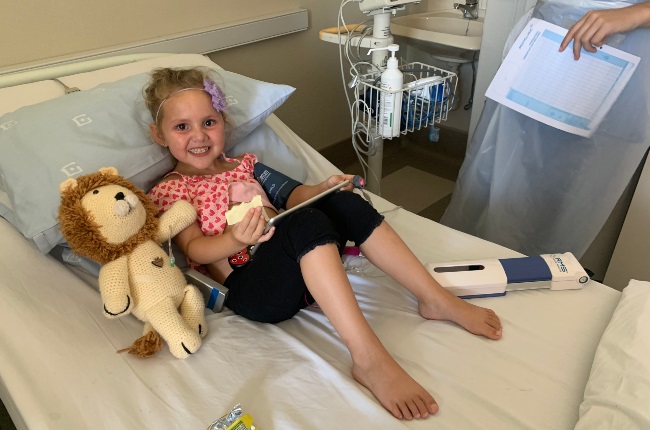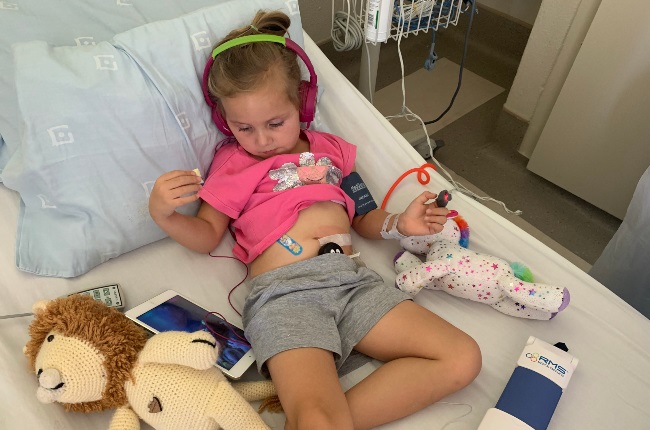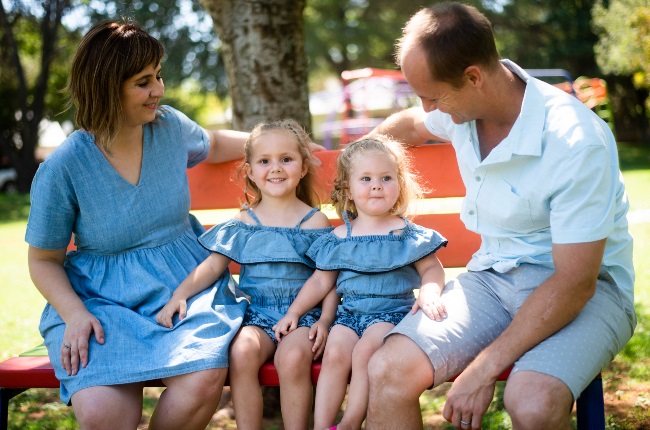
Parents Chantelle and Simon van der Bijl from Bloemfontein were overcome with worry after their daughter Lara (4) developed pneumonia at the start of the pandemic last year.
Several blood tests and hospital visits revealed the little girl had primary immunodeficiency (PID), which meant she was highly susceptible to infections because of a weakened immune system.
Chantelle tells YOU what the past year has been like for the family.
“I remember the day we found out Lara had PID. I had all these thoughts race through my mind, and my emotions were all over the place. We were in the middle of a pandemic. I needed to know my child would be okay.
After growing up in De Aar in the Northern Cape, my husband Simon and I moved to Bloem to study – I studied medicine and he went into mechanical engineering. Eventually we decided to settle down and start a family here. We’re high school sweethearts and we’ve been together since grade 9, so basically forever!
Lara is our first child and she was born in 2016 – she’s been such a joy, always a happy baby, apart from a few colicky moments.
I put her into crèche when she was four months old. Being a doctor and working shifts, I felt a school would be a better option to a nanny, who might not always be able to come to work. Soon after enrolling her in the crèche, Lara started picking up a number of infections – ear infections and sinus problems which I put down to her being around other kids.
I’d keep an eye on her and if I felt she wasn’t getting better, I’d start her on a set of antibiotics. They always worked and she responded well. She also had four sets of grommets.
In her first year, she was on antibiotics six to eight times to treat various upper respiratory tract infections. It was quite a lot, but at the time our paediatrician was happy. She was healthy and growing and there didn’t seem any need to be concerned.
But after our second daughter, Alana (now 2), was born, a few red lights went off in my head. She didn’t get sick nearly as often as her sister and I started to question whether there may be something more serious wrong with Lara.
Around March last year, after Lara battled pneumonia, my husband and I took her back to our paediatrician and a full blood test was done to check her antibody levels. These are immunoglobulins or antibodies found in the blood which help protect us from infections. A normal person’s IgG (immunoglobulin G) levels are above 6 but Lara’s were a 3 which was a concern.
Soon after that, the pandemic happened. Everything was put on hold as the country went into lockdown.
We couldn’t get to the doctor to run more tests or get to the bottom of anything. It was frustrating and stressful, since we sort of knew that something was off with her immunity and were petrified of her getting sick. We had a very hard time. My dad also passed away and it was devastating.
On some of those long days where you just want to hug and hold your family, no one was allowed to touch me when I got home from work as I was a frontline worker in casualty in a district hospital. Then I tested positive for Covid too.
I was dead scared of infecting Lara because I knew her body would struggle to fight off the virus. I isolated in our home and miraculously, none of my family got sick.
Around October we started to get back on track with everything and were advised to consult with an immunologist in Johannesburg. The doctor ran another set of tests and described her IgG levels as “on the ground” and “critical”. Something as simple as an ear infection could lead our daughter to ending up in ICU.
The tests showed that Lara had an immunodeficiency. This meant she was like a child who’d never been vaccinated. Her body didn’t create any antibodies to fight the diseases she was immunised against. If you can imagine, she almost needed to stay in a bubble to be kept away from the risk of infection. I cried and totally freaked out. It felt like it was the end of the world.
After long discussions we decided she’d need to do immunoglobulin infusion therapy. Antibodies are pulled from the plasma when people make blood donations, and that’s what’s given to patients with Lara’s condition via infusions. You can donate plasma alone as well, which is preferred as more antibodies can be collected. And you can donate every 2 weeks.
Like most children, she hates needles so I consulted with a play therapist on how to manage a chronically ill child – all the things you don’t learn in med school. She also received a bear from Rare Diseases SA, a lion named Lian who’s now her pal when she receives infusions. I told her a story about the soldiers in her body and how they weren’t strong enough so she needs “magic medicine” to help them.
She had her first infusion in February and although she cried at first, she’s been so brave, a real superstar. I’ve shared Lara’s journey via my blog ‘BloemMomDoc’ on Facebook, a place where I offer advice and tips to other moms. The following I’ve gained and responses we’ve received have been so heartwarming. She’ll need transfusions every week for the rest of her life, but I don’t ever want it to cause any psychological harm to her, as though this makes her any different. We’ll continue to do more tests to find out exactly what’s going on.”
- Trust your “mom gut” – if your child is sick, consult your doctor and don’t worry about being “that mom” always visiting the doctor.
- I was so uninformed at first, even as a doctor, on how to tell my child about a chronic or rare disease and how to manage it. Get credible sources of advice. There are so few resources locally, so I’d suggest parents do as much reading as possible or speak to a play therapist to help deal with ways of managing the news.
- It’s an emotionally taxing process so try to make it as easy as you can on your child and find a doctor you trust.




 Publications
Publications
 Partners
Partners




















